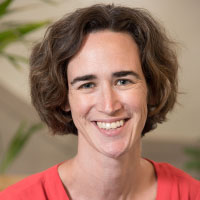Research Team Studying Elementary Science Honored

Eve Manz
Research Team Studying Elementary Science Honored
A research team led by BU Wheelock’s Eve Manz, assistant professor of science education, were the recipients of two awards at the International Society of the Learning Sciences (ISLS) Annual Meeting. The team, which includes Manz, postdoctoral researcher Chris Georgen, and PhD students Betsy Beckert and Annabel Stoler, won best paper and 3rd prize for best poster. Their research, which is funded by a National Science Foundation CAREER grant, studies productive uncertainty in elementary school science investigations.
Connecting science research and classrooms
Manz and Georgen’s paper examines ways to connect science investigations and scientific modeling in elementary classrooms. They worked with two teachers in the Somerville Public Schools to develop a multi-week investigation where students developed, used, and revised models to explore the conservation of matter.
“Many classrooms are moving to engaging young students, including elementary students, in modeling,” says Georgen, who studies the design and implementation of modeling. “But modeling is difficult to put in place in classrooms.”
“We use co-design strategies so that we can learn with teachers, drawing on their expertise and, together, figuring out new way for students to engage in science and the supports needed for students and teachers,” says Manz, whose research focuses on developing learning environments where students engage meaningfully in science and engineering practices. “For example, this work was conducted in a multi-lingual classroom, with children speaking in English, Portuguese, and Spanish. So we were able to learn from students and teachers about strategies for supporting language use through modeling.”
A shared goal of understanding
The lessons the team developed with the teachers helped students engage with a variety of models. These included simulations, pen-and-paper models, empirical models, and data models.
The poster designed by Beckert and Stoler focused on designing home-based science learning during the pandemic. “Fully remote learning during the pandemic provided a unique opportunity to make science more social, relevant, and connected to students and their families,” says Beckert, a doctoral student in language & literacy education who studies the multiple literacies of signing deaf students.
Participating in ISLS Annual Meeting was a highlight for the team. “It was exciting to talk one-on-one with other researchers and receive such positive feedback from leaders in the field,” says Stoler, a doctoral student in science education who studies designing inclusive classroom environments and preparing pre-service teachers to approach teaching with an equity-focused lens.
Adds Georgen, “Sharing our ideas and engaging in conversations with researchers, professionals, and educators keeps us focused on our shared goal of understanding and improving elementary science learning.”